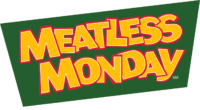How to Eat for Earth Day…and Beyond
Earth Day is a call-to-action, an urgent reminder that the fate and future of our planet is within our control. If we act together it’s possible to correct course and preserve our Earth and fragile global ecosystem.
Greenhouse gas emissions have reached dangerous levels, threatening our planet and way of life. We see examples of climate change every day: rising sea levels, hotter temperatures, species extinction, and an increase in extreme weather conditions and events. With all these natural disasters unfolding in front of us, it’s hard to deny that the future is at risk.
And while sources of greenhouse gas emissions vary, one of the greatest contributors is the livestock industry, which alone makes up an estimated 14.5% of all global greenhouse gas emissions from human activities—more than the entire transportation sector combined.
Climate change may seem like an insurmountable obstacle, but there’s a lot that you can do as an individual — and as part of a broader community — to make an impact. This Monday, learn how you can shop, cook, eat, and educate to help protect the planet.
Eat More Sustainable Foods
In 2019, the World Wildlife Foundation identified their top 50 foods for a sustainable future. These foods, which include greens, tubers, nuts, seeds, pulses, mushrooms, and vegetables, are all nutrient-dense and environmentally friendly. This Monday, look through our list of sustainable foods and consider adding some to your shopping cart during your next supermarket run.
Adopt Meatless Monday
Well, this is an easy one. Plant-based eating contributes to healthy, sustainable food practices. Shifting to a more plant-based diet has the potential to help decrease agricultural land use by as much as 80 percent. Plus, it’s good for your health. Incorporating Meatless Monday into your diet is easy, and it can be a fun way to experiment with new ingredients, cuisines, and cooking techniques.
Cut Food Waste by Making Food Last Longer
Wasted food is the single largest category of material in municipal landfills, which also produces greenhouse gases contributing to climate change. Storing food in glass containers, buying frozen fruits and vegetables, understanding expiration dates, and freezing leftovers are just a handful of the many things you can do to keep more food out of the trash can and in your belly.
Compost
When you don’t compost your food waste, it’s almost always sent to the landfill with the other garbage. The problem is that much of this organic material rots when it isn’t disposed of properly, releasing methane and carbon dioxide in the process. These greenhouse gases trap heat and make the planet warmer. Composting has other benefits as well: it helps control erosion, improves soil health, and contributes to revitalizing local water sources. Some cities have compost drop off stations, and there are also a number of DIY composting projects you can do to make composting at home easier.
Try Meat Alternatives
Finding alternatives to your favorite meaty foods is an excellent approach to reducing your meat consumption and environmental footprint. And thanks to some clever home cooks, there’s a number of different ways you can recreate meat-centric dishes and ingredients using only plant-based foods, whether it’s pork, beef, chicken, bacon, or the most craveable comfort foods.
Stock Your Pantry with Foods that Won’t Go Bad
Every food item will eventually go bad, but there are many food staples that offer a terrific value, can be prepared in big batches, and have an incredibly long shelf-life. Some of these ingredients can serve as the centerpiece of a meal, like potatoes, beans, and pasta, while others act as supporting actors, providing quick bursts of flavor to ordinary dishes. Browse our list of plant-based ingredients that won’t go bad, and pick some up on your next food shop.
Be an Advocate for Delicious (Sustainable) Food
According to our research, many people find it difficult to reduce their meat consumption and eat more plant-based foods because their friends and family do not want to eat meatless meals. Help break down the myths and misconceptions around protein, nutrition, and taste by sharing great tasting plant-based meals. Encourage your friends, family, and colleagues to get involved, take the Meatless Monday Challenge together, and schedule some events or dinner parties around meatless eating.
Get started today by following @MeatlessMonday and signing up for our weekly newsletter to get easy tips, recipes, and news.
